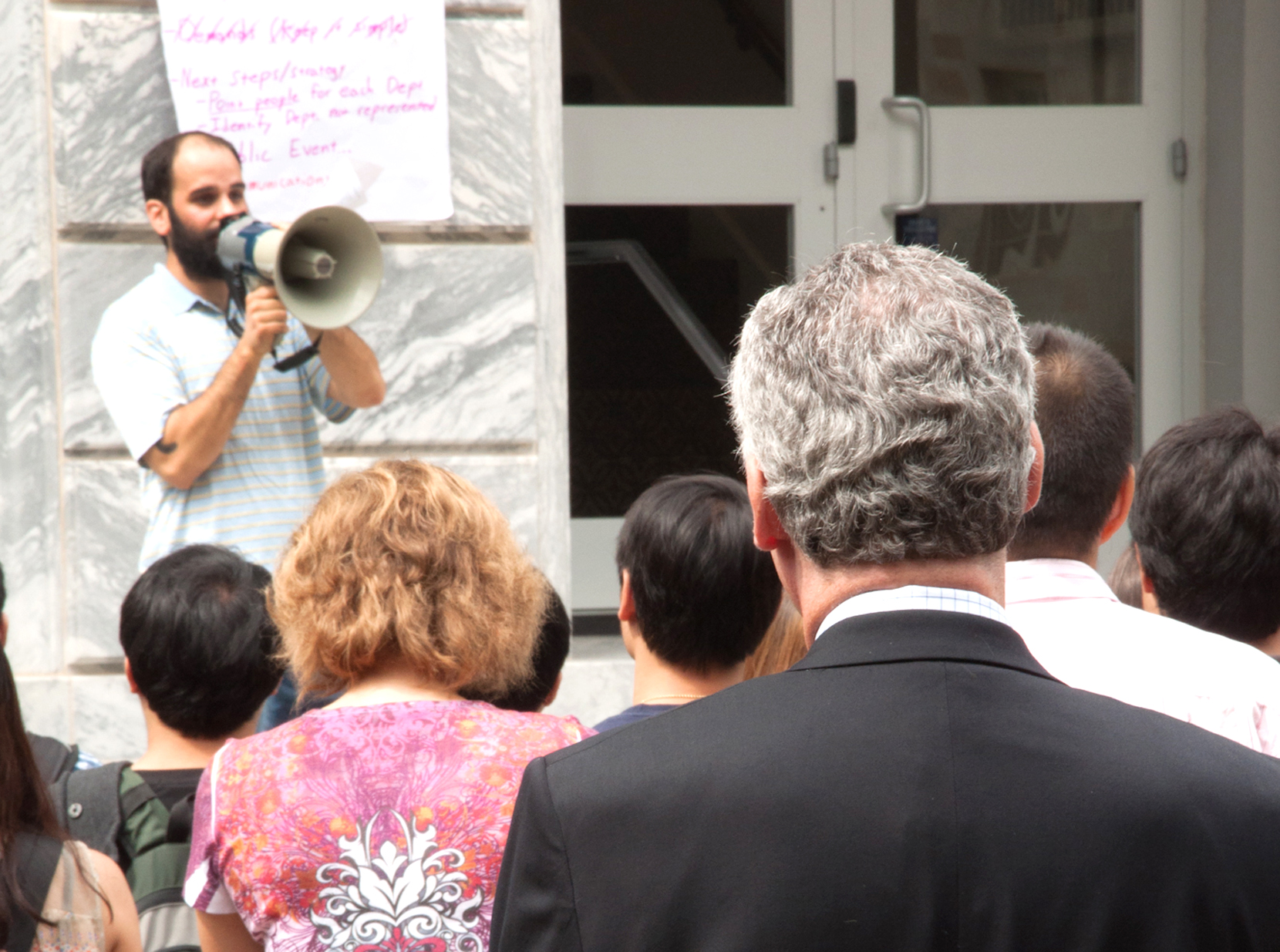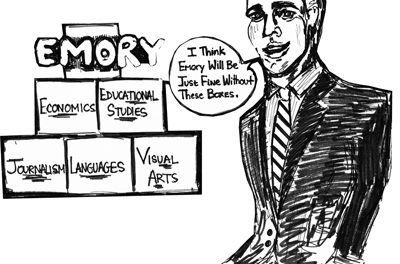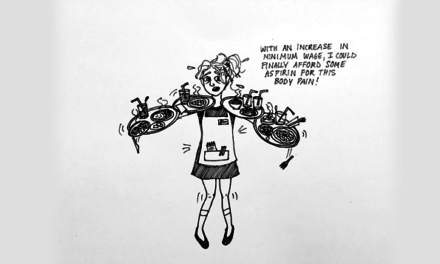In 1978, 1,200 students staged a three-day sit-in to protest massive cuts by their university. Their confrontation only ended when the university agreed to establish a more inclusive decision-making process that gave a seat on the board of trustees to one faculty member and one student. The provost advocating the cuts “resigned” later that year.
No, this did not happen at Emory. This happened at the University of Pennsylvania where Dean Robin Forman earned his degree in mathematics just three years later. Unfortunately for Emory students and faculty, Dean Forman did not decide to institute the reforms his classmates won for him.
On Friday, it was made public that Emory College would phase out its Journalism, Educational Studies, Physical Education and Visual Arts programs.
The graduate school also announced that it would be suspending admissions to its Institute of Liberal Arts as well as its Economics, Spanish and Portuguese PhD programs for at least the next five years. The resources from these programs would be reallocated, as Dean Forman puts it, into programs that will help further Emory’s goal of academic eminence. These include, but are not limited to, contemporary studies of China and furthering multimedia programs.
These “reallocations” will have major effects on our university. The phasing out of Emory’s PhD program in economics alone will have reverberations that I am not certain Dean Forman has considered (for more information about how one of the largest majors at Emory will be affected, read the Wheel’s article published last Friday).
These cuts – explained to the public as being a choice – are not necessary in the immediate term. There is, assuming that the University is in fact not in deficit, no reason for Emory to rush into making these kinds of decisions.
The official benefits provided by these “reallocations” also makes no sense. In an earlier interview with the Wheel, Forman stated that the cuts would create “intriguing opportunities by renewing Emory’s commitment to academic eminence.”
That sounds all fine and good, except I have no idea what that means. And what does the niche study of contemporary China have to do with Emory’s liberal arts mission?
Nor have adequate reasons been provided for specific programs being cut.
During both his meeting with the Wheel and during a discussion with the current director of the Journalism Program, Hank Klibanoff, Forman emphasized the point that the Journalism Program focuses on preparing students for a particular job in a particular market. Therefore, a program like journalism does not, in his opinion, really mesh with the liberal arts.
It is a very rare thing when a university dean publicly states that his or her biggest problem with an academic program is that it is too focused on training its students in skills that will lead to real jobs.
But these are all digressions that shield students from understanding what is really at stake.
The really big question is not whether or not journalism, economics PhD or any other graduate and undergraduate programs deserves getting the axe.
Though such questions deserve answers, the really big question we should be asking ourselves and Dean Forman is this: what kind of university do we want? Are we really a top 20 research university when we are limiting academic options for students? Should Emory limit its academic horrizons?
As Dean Forman points out, Emory has limitless opportunities but limited resources. This means that choices have to be made. In this, I am in full agreement.
But this is a discussion that Robin Forman and his supporters within the administration have decided to make private. They didn’t think that students – who supply the funds for 80 percent of the college’s budget – or the heads of the affected departments, were grown-up enough to take part in such an important discussion before a decision was made.
It should be made clear that I do not know if Dean Forman is right. He could very well be onto something that will strengthen Emory and make it a better place to learn. But it should also be made clear that Dean Forman also does not know if he is right either.
And that right there is the problem.
Regardless of the merits of Dean Forman’s and, it must be said, President Wagner’s decision, there should have been a serious discussion among administrators, faculty and students about where we, the Emory community, want this university to go. By bypassing the building of a true consensus, administration officials have delegitimized their choice.
Former Editorials Editor James Sunshine is a College senior from Boca Raton, Fla.
Photography by James Crissman
The Emory Wheel was founded in 1919 and is currently the only independent, student-run newspaper of Emory University. The Wheel publishes weekly on Wednesdays during the academic year, except during University holidays and scheduled publication intermissions.
The Wheel is financially and editorially independent from the University. All of its content is generated by the Wheel’s more than 100 student staff members and contributing writers, and its printing costs are covered by profits from self-generated advertising sales.






A well-written and articulate editorial Mr. Sunshine. As one of the students who was unexpectedly arrested for exercising my right to free speech and association on the Quad last year, I must admit that while I was completely shocked to hear about the cuts to my graduate program and others, I was not at all surprised by the administration’s disregard of democratic participation or decision making of any kind. They have exhibited this contempt for the integrity of the Emory community many times over the past two years alone, and appear to become more shameless with each passing transgression. Not only did this administration completely ignored the struggle of contracted workers – the least paid and the most vulnerable individuals on campus – it arrested students who were trying to animate community dialogue to help find ethical solutions to their unjust and unequal treatment. In response, more than 300 faculty expressed outrage at the “Open” Forum in May 2011 at the fact that they were not consulted on ways to address contracted workers’ conditions nor the decision to arrest Emory students and throw them in jail. This past April, the administration also rejected an alumni petition with 271 signatures asking the administration to drop the charges against the arrested students — the charges against me and the other six students have still yet to be dropped 18 months after my arrest. Then there was the admissions score scandal this past August, after which administration officials were somehow praised for the way they handled the situation, even though they failed miserably in their executive responsibilities and failed to apologize to the students they had deceived. And yet, as a community, we are somehow surprised when the administration engages in privileged, closed-door meetings and implements drastic and non-sensical cuts that disrupt hundreds of students’ studies (in mid-September, coincidentally after we’ve paid tuition) and undercut dozens of faculty and staff, who must now direct their attention to finding new jobs rather than teaching and contributing to students’ academic achievement. Of course, everyone directly affected by these cuts recognizes that difficult decisions must be made in times of economic hardship – but I agree that *how* these decisions are made, and consideration for those who will be hardest hit (who are usually at the bottom), are equally, if not more important than the cuts themselves. And in these respects, current Emory administrators have demonstrated – once again – their failure in leadership and blatant disregard for this institution’s core principles of courageous inquiry and ethical engagement.
Please, sign the petition to save the PhD program in economics. Do not be anonymous, please, so that we have actual people behind the petition when it is presented to Emory’s president. Also join us on facebook at “Save the Economics PhD Program at Emory”.
http://www.ipetitions.com/petition/save-emory-universitys-economics-phd-program/